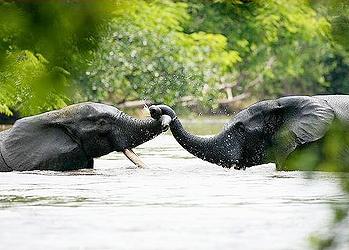
BRAZZAVILLE, Republic of Congo, December 12, 2013 (ENS) – Scaled-up enforcement actions against elephant poachers and illegal ivory traders in Republic of Congo have led to a wave of arrests in the country over the past two months.
Anti-poaching initiatives resulting in the arrests of three people were conducted by African Parks’ Anti-Poaching Unit at Odzala-Kokoua National Park.

African Parks is a nonprofit organization that “takes total responsibility for the rehabilitation and long-term management of national parks in partnership with governments and local communities.”
At 13,500 square kilometers, Odzala-Kokoua is the Congo’s largest national park and is located in the second largest rainforest region in the world.
In addition, the arrests of eight people were initiated by the nonprofit Project for the Application of Law for Fauna, PALF, working with the national police, the Gendarmerie Nationale.
African Parks congratulates the Congolese Ministry of Forest Economy and Sustainable Development, which is responsible for the country’s elephant protection efforts; the Gendarmerie Nationale; PALF and Odzala-Kokoua’s Anti-Poaching Unit on these recent breakthroughs.
“The growing list of arrests is a testimony to the fact that our combined tactics are delivering results in the fight against elephant poaching in the region,” said African Parks CEO Peter Fearnhead.
In October, two poachers were arrested on the eastern boundary of the park by Odzala’s Anti-Poaching Unit. They admitted selling ivory to a Chinese national, an employee of the China Road and Bridge Corporation, CRBC. His driver also was arrested.
The men were found in possession of pieces from three tusks which had been stashed at the CRBC camp at Moyoye. On inspecting the camp, Odzala’s Anti-Poaching Unit found evidence that the site had been used to cut and shape ivory into artifacts. The two men were charged but released on bail and the case is currently before the national prosecutor.
In November at Yengo control post, southeast of Odzala, a Chinese national was arrested by Odzala’s eco-guards after a piece of ivory was found in his laptop bag. Traces of ivory were discovered again at the CRBC camp at Moyoye where the Chinese national was based. He was arrested but released by the prosecutor based in Ouesso.
In late November, anti-poaching operations supported by PALF resulted in the arrests of eight people, with more arrests set to follow.
The operation started with an enormous elephant tusk seized by PALF and a consortium of nongovernmental organizations, while another ivory haul from a dealer included a sack full of sculpted ivory.
On November 30, another dealer with sculpted ivory was arrested, and later that day a Chinese national attempted to board a flight at Maya Maya Airport in Brazzaville with a suitcase of ivory after bribing a “fixer” to get it through.

A team of people from the Ministry of Forest Economy and Sustainable Development working with the Departmental Director of the Lusaka Agreement Task Force and the Gendarmerie Nationale arrested the Chinese national along with the person who accepted the bribe to facilitate the passage of his luggage undetected through customs.
Before African Parks took on the management of Odzala under the auspices of the Odzala-Kokoua Foundation in 2011, the central area of the park had not been patrolled for four years.
Since then, African Parks has implemented a multi-pronged anti-poaching plan to address threats. A unique amnesty program has seen the recruitment and training of 28 former poachers to become eco-guards focused on anti-poaching, as well as 17 former poachers trained as eco-monitors.
In May, five applicants to the Odzala Amnesty Programme confessed to previously working with Congolese ivory kingpin, Ngondjo Ghislain, known by the nickname Pepito. He was convicted in July and is currently serving a five year prison sentence.
Elephant poaching is connected to other types of crime and atrocities, says Fearnhead. “The Lord’s Resistance Army is now part of a larger poaching crisis that is decimating elephants throughout central Africa,” he said. “The high price of ivory is increasingly incentivizing the involvement of armed groups such as the LRA, sustaining their atrocities in the region.”
In 2014, with the assistance of the new U.S.-based Richardson Foundation, African Parks plans to set up a permanent eco-guard training facility in Odzala-Kokoua National Park.
Former New Mexico Governor Bill Richardson, founder of the Richardson Center for Global Engagement, and Senior Director of TRAFFIC/World Wildlife Fund, Crawford Allan, launched a partnership on October 31 to advance new strategies to combat illegal wildlife trafficking in key parts of Africa.
With more than 30,000 elephants alone killed each year, nearly 100 per day, there is an urgent need to advance promising, state-of-the-art technology solutions, practices and tools in the fight against wildlife poaching. The Richardson Foundation is also launching a diplomatic effort with African heads of state designed to dedicate funds raised from forfeited assets to support anti-poaching efforts.
Copyright Environment News Service (ENS) 2013. All rights reserved.
© 2013, Environment News Service. All rights reserved. Content may be quoted only with proper attribution and a direct link to the original article. Full reproduction is prohibited.
